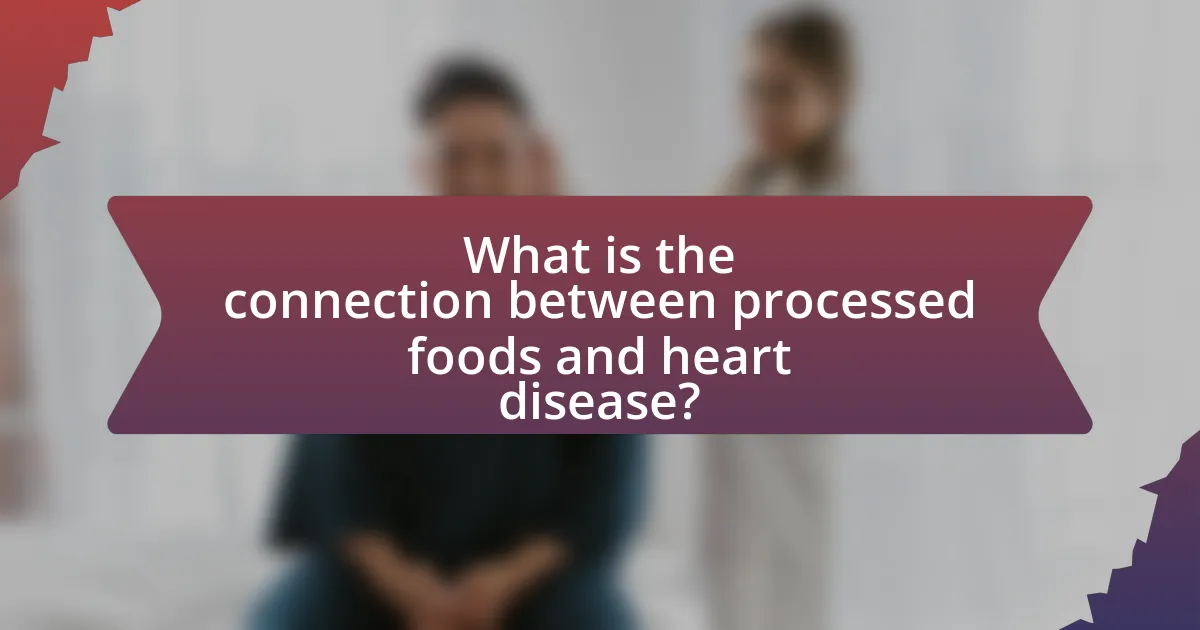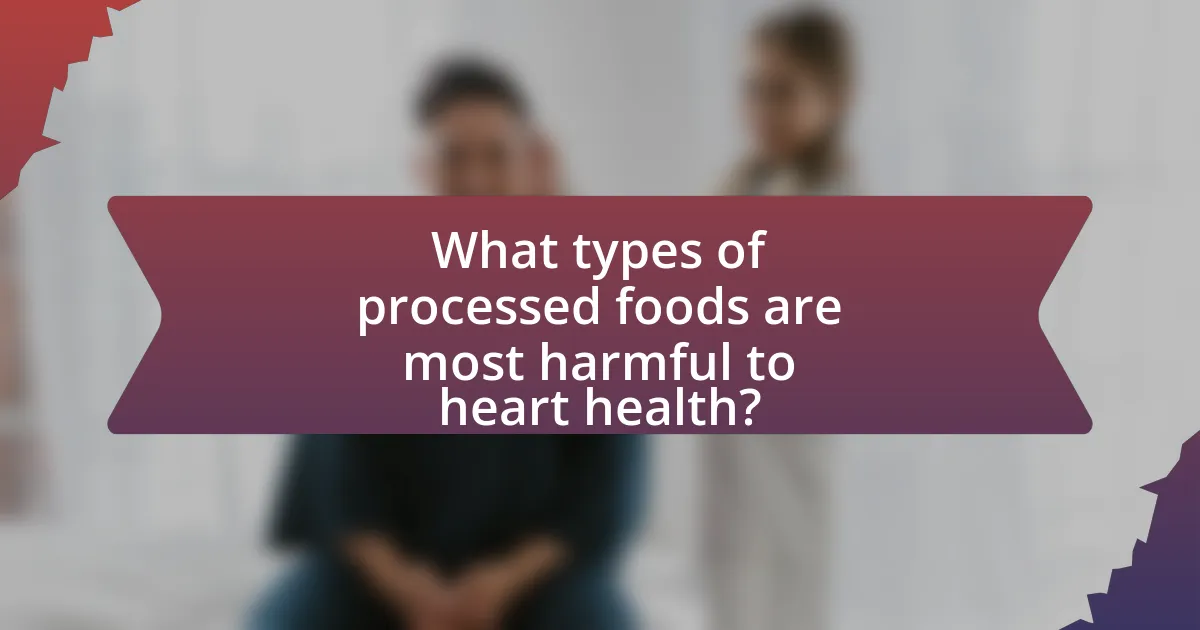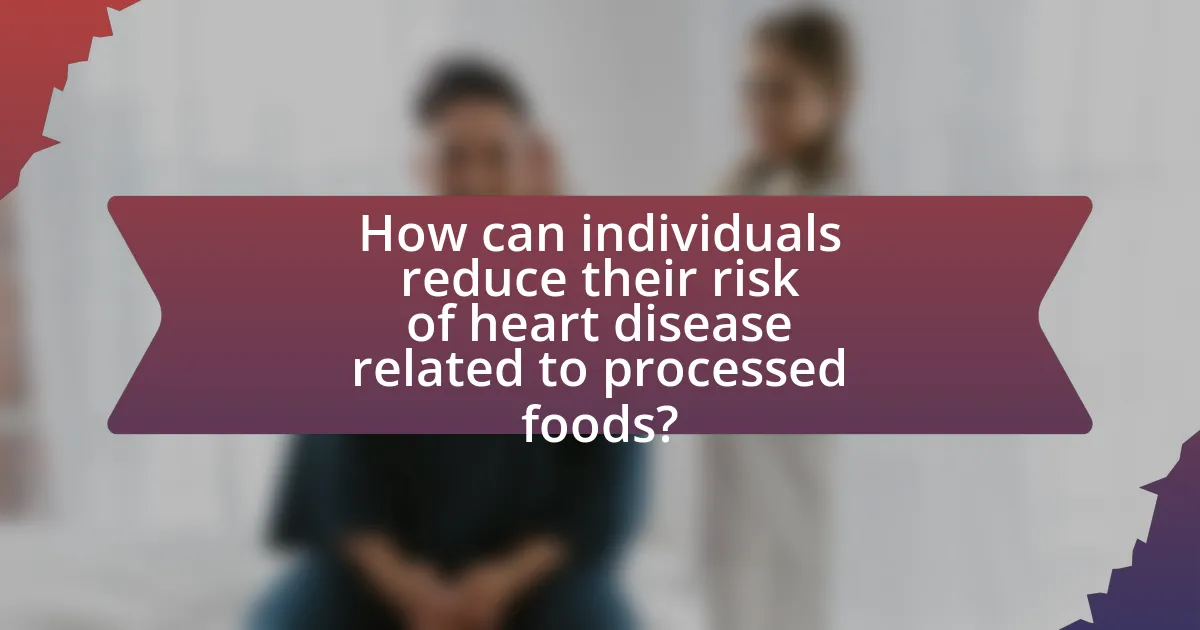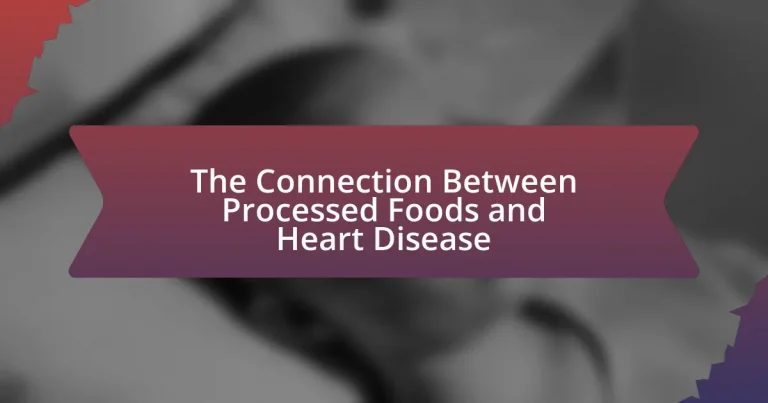The article examines the connection between processed foods and heart disease, highlighting how high levels of unhealthy fats, sugars, and sodium in these foods contribute to significant cardiovascular risk factors such as obesity, hypertension, and elevated cholesterol. Research indicates that increased consumption of ultra-processed foods correlates with a higher risk of heart disease, with specific ingredients like trans fats and excessive sodium being particularly harmful. The article emphasizes the importance of dietary choices in preventing heart disease and suggests alternatives to processed foods, including whole, unprocessed options that can improve heart health. Additionally, it discusses lifestyle modifications and practical tips for reducing processed food intake to mitigate heart disease risk.

What is the connection between processed foods and heart disease?
Processed foods are linked to an increased risk of heart disease due to their high levels of unhealthy fats, sugars, and sodium. These components contribute to obesity, hypertension, and elevated cholesterol levels, which are significant risk factors for cardiovascular conditions. Research published in the British Medical Journal indicates that a higher consumption of ultra-processed foods is associated with a 12% increase in the risk of heart disease. This correlation highlights the detrimental effects of processed foods on heart health, emphasizing the importance of dietary choices in preventing cardiovascular diseases.
How do processed foods contribute to heart disease?
Processed foods contribute to heart disease primarily through their high levels of unhealthy fats, sugars, and sodium. These components can lead to increased cholesterol levels, hypertension, and inflammation, all of which are risk factors for cardiovascular diseases. For instance, a study published in the Journal of the American College of Cardiology found that higher consumption of ultra-processed foods is associated with a greater risk of heart disease, with participants consuming more than four servings daily facing a 62% increased risk compared to those consuming less than two servings. This evidence highlights the detrimental impact of processed foods on heart health.
What specific ingredients in processed foods are linked to heart disease?
Trans fats and high levels of sodium in processed foods are specifically linked to heart disease. Trans fats, often found in partially hydrogenated oils, increase LDL cholesterol and lower HDL cholesterol, contributing to arterial plaque buildup. A study published in the Journal of the American College of Cardiology found that trans fat consumption is associated with a higher risk of coronary heart disease. Additionally, excessive sodium intake, prevalent in processed foods, can lead to hypertension, a significant risk factor for heart disease, as indicated by research from the American Heart Association.
How do additives and preservatives in processed foods affect heart health?
Additives and preservatives in processed foods can negatively impact heart health by contributing to inflammation, increasing blood pressure, and promoting unhealthy cholesterol levels. For instance, trans fats, often found in processed foods, are linked to higher levels of LDL cholesterol and lower levels of HDL cholesterol, which increases the risk of heart disease. Additionally, sodium-based preservatives can elevate blood pressure, a significant risk factor for cardiovascular issues. Research published in the Journal of the American College of Cardiology indicates that high consumption of processed foods is associated with a greater risk of heart disease, highlighting the detrimental effects of these additives on cardiovascular health.
Why is understanding this connection important?
Understanding the connection between processed foods and heart disease is crucial because it directly impacts public health and individual dietary choices. Research indicates that high consumption of processed foods, which often contain unhealthy fats, sugars, and sodium, is linked to increased risks of heart disease. For instance, a study published in the British Medical Journal found that a 10% increase in the proportion of ultra-processed foods in the diet was associated with a 12% increase in cardiovascular disease risk. This knowledge empowers individuals to make informed dietary decisions, potentially reducing the prevalence of heart disease and improving overall health outcomes.
What are the statistics on heart disease related to processed food consumption?
Processed food consumption significantly increases the risk of heart disease, with studies indicating that individuals consuming high amounts of processed foods have a 50% higher likelihood of developing cardiovascular diseases. Research published in the Journal of the American College of Cardiology found that each additional serving of ultra-processed food per day is associated with a 12% increase in the risk of heart disease. Furthermore, a study from the European Journal of Preventive Cardiology reported that diets high in processed foods correlate with higher levels of cholesterol and blood pressure, both of which are risk factors for heart disease.
How does heart disease impact overall health and longevity?
Heart disease significantly reduces overall health and longevity by increasing the risk of severe complications such as heart attacks, strokes, and heart failure. These conditions can lead to decreased quality of life and premature death. According to the American Heart Association, cardiovascular diseases are the leading cause of death globally, accounting for approximately 32% of all deaths in 2019. Furthermore, individuals with heart disease often experience comorbidities like diabetes and hypertension, which further complicate their health status and longevity. Studies indicate that heart disease can shorten life expectancy by an average of 10 years, emphasizing its profound impact on both health and lifespan.

What types of processed foods are most harmful to heart health?
Highly processed foods that are most harmful to heart health include sugary beverages, trans fats, and high-sodium snacks. Sugary beverages, such as sodas and energy drinks, contribute to obesity and insulin resistance, both of which are risk factors for heart disease. Trans fats, commonly found in margarine, baked goods, and fried foods, raise LDL cholesterol levels while lowering HDL cholesterol, increasing the risk of cardiovascular events. High-sodium snacks, including processed meats and packaged chips, can lead to hypertension, a significant risk factor for heart disease. Studies have shown that diets high in these processed foods correlate with increased rates of heart disease, emphasizing the need for dietary awareness.
Which categories of processed foods should be avoided?
Categories of processed foods that should be avoided include sugary beverages, refined carbohydrates, and high-sodium snacks. Sugary beverages, such as sodas and energy drinks, contribute to obesity and increase the risk of heart disease due to high sugar content. Refined carbohydrates, found in white bread and pastries, can lead to insulin resistance and elevated blood sugar levels, which are linked to cardiovascular issues. High-sodium snacks, like processed meats and packaged chips, can raise blood pressure, a significant risk factor for heart disease.
What are the health risks associated with sugary processed foods?
Sugary processed foods pose significant health risks, including obesity, type 2 diabetes, and cardiovascular disease. These foods often contain high levels of added sugars, which contribute to excessive calorie intake and insulin resistance. Research indicates that high sugar consumption is linked to increased triglycerides and lower HDL cholesterol, both of which are risk factors for heart disease. A study published in the Journal of the American College of Cardiology found that individuals consuming more than 25% of their daily calories from added sugars had a higher risk of dying from heart disease compared to those consuming less than 10%. Additionally, sugary processed foods can lead to inflammation and increased blood pressure, further exacerbating cardiovascular risks.
How do high-sodium processed foods affect blood pressure?
High-sodium processed foods significantly increase blood pressure. The high sodium content in these foods leads to fluid retention in the body, which raises blood volume and, consequently, blood pressure. Research indicates that a diet high in sodium can elevate blood pressure levels, contributing to hypertension, a major risk factor for heart disease. For instance, a study published in the American Journal of Hypertension found that reducing sodium intake can lower blood pressure in individuals with hypertension. This evidence underscores the direct relationship between high-sodium processed foods and elevated blood pressure, highlighting the importance of monitoring sodium consumption for cardiovascular health.
What alternatives exist to harmful processed foods?
Whole, unprocessed foods serve as effective alternatives to harmful processed foods. These include fresh fruits, vegetables, whole grains, nuts, seeds, and lean proteins. Research indicates that diets rich in whole foods can lower the risk of heart disease by reducing inflammation and improving cholesterol levels. For instance, a study published in the Journal of the American College of Cardiology found that individuals consuming a diet high in fruits and vegetables had a significantly lower risk of cardiovascular events. Thus, incorporating these alternatives can promote heart health and mitigate the adverse effects associated with processed foods.
What are some heart-healthy substitutes for processed snacks?
Heart-healthy substitutes for processed snacks include fresh fruits, vegetables, nuts, seeds, whole grain crackers, and yogurt. These alternatives provide essential nutrients and healthy fats while being lower in sodium and added sugars compared to processed snacks. For instance, a study published in the Journal of the American College of Cardiology highlights that diets rich in fruits and vegetables are associated with a reduced risk of heart disease. Additionally, nuts and seeds contain healthy fats that can improve cholesterol levels, further supporting heart health.
How can meal planning reduce reliance on processed foods?
Meal planning can reduce reliance on processed foods by encouraging the preparation of fresh, whole ingredients in advance. When individuals plan their meals, they are more likely to incorporate fruits, vegetables, whole grains, and lean proteins, which are less processed and more nutritious. Research indicates that meal planning can lead to healthier eating patterns, as it allows for better control over ingredients and portion sizes, ultimately decreasing the likelihood of opting for convenient, processed options. A study published in the Journal of Nutrition Education and Behavior found that individuals who engage in meal planning consume fewer calories and have a higher intake of essential nutrients, further supporting the effectiveness of meal planning in promoting healthier food choices.

How can individuals reduce their risk of heart disease related to processed foods?
Individuals can reduce their risk of heart disease related to processed foods by minimizing their consumption of these foods and opting for whole, unprocessed alternatives. Processed foods often contain high levels of trans fats, sodium, and added sugars, which are linked to increased heart disease risk. For instance, a study published in the Journal of the American College of Cardiology found that higher intake of ultra-processed foods is associated with a greater risk of cardiovascular disease. By choosing fresh fruits, vegetables, whole grains, and lean proteins, individuals can improve their heart health and lower their risk of developing heart disease.
What dietary changes can help mitigate risks?
To mitigate risks associated with heart disease, individuals should adopt a diet rich in whole foods, including fruits, vegetables, whole grains, lean proteins, and healthy fats. Research indicates that diets high in processed foods, which often contain excessive sugars, unhealthy fats, and sodium, significantly increase the risk of cardiovascular diseases. For instance, a study published in the Journal of the American College of Cardiology found that higher consumption of ultra-processed foods is linked to a 12% increase in the risk of heart disease. Therefore, reducing processed food intake and focusing on nutrient-dense options can effectively lower heart disease risk.
How can increasing whole food intake improve heart health?
Increasing whole food intake can improve heart health by providing essential nutrients, reducing inflammation, and lowering cholesterol levels. Whole foods, such as fruits, vegetables, whole grains, nuts, and seeds, are rich in fiber, antioxidants, and healthy fats, which contribute to cardiovascular health. Research indicates that diets high in whole foods are associated with a lower risk of heart disease; for instance, a study published in the Journal of the American College of Cardiology found that individuals consuming a diet rich in whole foods had a 30% lower risk of developing heart disease compared to those with a diet high in processed foods. This evidence supports the conclusion that increasing whole food intake is beneficial for heart health.
What role does cooking at home play in reducing processed food consumption?
Cooking at home significantly reduces processed food consumption by allowing individuals to control ingredients and preparation methods. When people prepare meals at home, they are more likely to use fresh, whole ingredients rather than pre-packaged, processed options that often contain unhealthy additives, preservatives, and high levels of sodium and sugar. Research indicates that home-cooked meals are associated with healthier dietary patterns, as evidenced by a study published in the journal “Public Health Nutrition,” which found that individuals who frequently cook at home consume fewer calories and have a lower risk of obesity and related diseases. This shift towards home cooking not only promotes healthier eating habits but also contributes to better heart health by minimizing the intake of processed foods linked to heart disease.
What lifestyle modifications support heart health?
Regular physical activity, a balanced diet rich in fruits and vegetables, maintaining a healthy weight, and avoiding tobacco use are lifestyle modifications that support heart health. Engaging in at least 150 minutes of moderate aerobic exercise weekly can lower the risk of heart disease by improving cardiovascular fitness and reducing blood pressure. A diet low in saturated fats, trans fats, and sodium, while high in fiber, can help manage cholesterol levels and reduce the risk of heart disease. Furthermore, maintaining a body mass index (BMI) within the normal range is associated with lower risks of heart-related issues. Avoiding tobacco is crucial, as smoking significantly increases the risk of heart disease by damaging blood vessels and reducing oxygen in the blood.
How does regular physical activity influence heart disease risk?
Regular physical activity significantly reduces the risk of heart disease. Engaging in consistent exercise helps lower blood pressure, improve cholesterol levels, and maintain a healthy weight, all of which are critical factors in heart health. According to the American Heart Association, individuals who participate in at least 150 minutes of moderate-intensity aerobic activity per week can decrease their risk of heart disease by up to 30-40%. Additionally, physical activity enhances insulin sensitivity and reduces inflammation, further contributing to cardiovascular health.
What stress management techniques can benefit heart health?
Stress management techniques that can benefit heart health include mindfulness meditation, regular physical activity, and deep breathing exercises. Mindfulness meditation has been shown to reduce stress and lower blood pressure, which is crucial for heart health. A study published in the Journal of the American College of Cardiology found that individuals who practiced mindfulness had a significant reduction in cardiovascular risk factors. Regular physical activity, such as aerobic exercise, improves heart function and reduces stress hormones, contributing to overall cardiovascular health. Additionally, deep breathing exercises can activate the body’s relaxation response, lowering heart rate and blood pressure, which further supports heart health.
What practical tips can help individuals avoid processed foods?
To avoid processed foods, individuals should focus on cooking meals from whole, unprocessed ingredients. Preparing meals at home allows for better control over ingredients and reduces reliance on pre-packaged options, which often contain additives and preservatives linked to health issues. Research indicates that diets high in processed foods are associated with increased risks of heart disease, highlighting the importance of whole foods in maintaining cardiovascular health. By prioritizing fresh fruits, vegetables, whole grains, and lean proteins, individuals can significantly decrease their intake of processed foods and improve their overall health outcomes.





